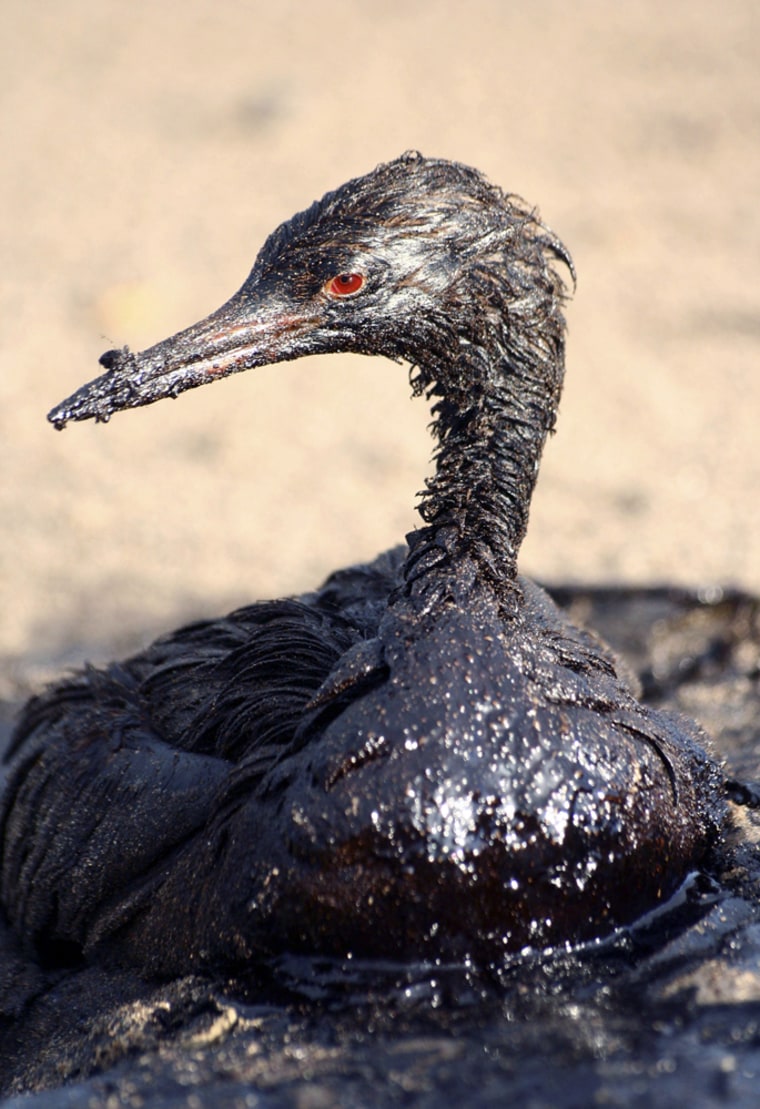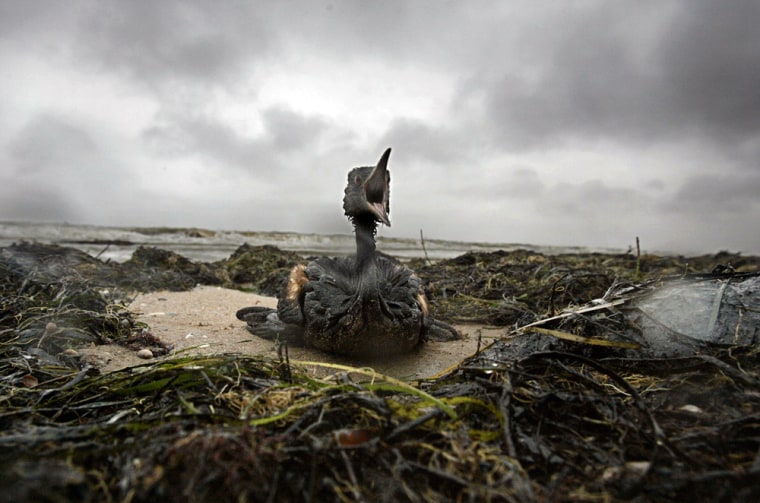Rescuers on Monday recovered the bodies of three sailors after a Russian freighter sank near the Black Sea, while a slick of oil from a sunken tanker began washing onto beaches. Officials were assessing what could be the worst environmental disaster in the region in years.
"The damage is so huge it can hardly be evaluated. It can be compared to an ecological catastrophe," Interfax news agency quoted Alexander Tkachyov, governor of Russia's Black Sea region of Krasnodar, as saying.
"Thirty thousand birds have died, and it's just impossible to count the loss of fish," he told regional officials.
Russian President Vladimir Putin sent Prime Minister Viktor Zubkov to the scene to oversee the cleanup.
The sea was calm again by Monday but at Novorossiisk, Russia's second biggest port for exports of oil and oil products, officials had ordered tankers not to dock because a second storm was on its way.
As many as 10 ships sank or ran aground in the northern Black Sea region during the fierce storm, including the Volganeft-139, an oil tanker loaded with nearly 1.3 million gallons of fuel oil.
Nearly half its cargo spilled into the Strait of Kerch, a narrow waterway linking the Black Sea and the smaller Sea of Azov.
At the coastal settlement of Ilyich, about 100 workers were on the beach using shovels and a bulldozer to scrape globules of oil off the sand.
"This oil came in last night, along a 13 kilometer (8 mile) stretch," said Alexander Mikhalkov, foreman of the cleanup crew.
Wild dogs attack oiled birds
A flock of about 1,000 rails, a species of wetland bird, were huddled on the beach, unable to fly because their feathers were coated with oil. Some were unable to stand.

Cleanup workers said wild dogs had been taking advantage of the birds' condition to attack them. A Reuters reporter found a number of the birds on the beach with their heads torn off.
Oleg Mitvol, deputy head of Russia's environment agency, said the spill could take years to fix. "This is a very serious environmental disaster," he said on Sunday.
The polluted area is at the heart of the migration route from central Siberia into the Black Sea of red-throated and black-throated Siberian diver birds.
The spill raised questions about maritime safety in the Kerch Strait, a busy waterway which separates Ukraine's Crimea peninsula and southern Russia.
Ukrainian Prime Minister Viktor Yanukovich said that at the moment the slick was moving away from Ukraine, but measures should be taken to prevent future disasters.
"In the Borsphorous Straits, it's not possible to use tankers which have no double hulls. How is the Kerch strait different? It isn't," he said at a news briefing in Kiev.
Environmental campaign group Greenpeace said the oil spill revealed the shortcomings of shipping safety in the region.
"In Russia we do not have one hundred percent of our ships maintained in a suitable condition as is the practice in the West," Alexei Kiselyov, coordinator of Greenpeace Russia's anti-pollution campaigns, told Reuters. "In the last few days we have seen a very clear demonstration of that."
Bodies recovered
The bodies of sailors from the freighter Nakhichevan were recovered near Tuzla on the western side of the Strait of Kerch. Emergency Situations spokesman Sergei Kozhemyaka said rescuers were looking for five others.
The Nakhichevan was one of two freighters that broke up as 18-foot waves and high winds battered ships throughout the region.
After rescuing the Russian oil tanker’s 13 crew members, workers began what could be a long-term effort to clean up the spill.

They shoveled the tar-like, oil-laden sands and seaweed into piles on the shore as slick-covered waters lapped at their boots. Oil covered birds could be seen trying to swim flap their wings.
Anatoly Yanhuck, a regional coast guard officer, said workers would begin pumping oil from the tanker once the weather improves, then tow the ship to port.
Investigators will question the ship’s captain but Yanhuck said the weather appeared to have been worse than forecast.
Maxim Stepanenko, a regional prosecutor, told Vesti 24 television on Sunday that captains had been warned about the stormy conditions. He said the Volganeft-139 — designed during Soviet times to transport oil on rivers — was not built to withstand a fierce storm.
Sulfur also spilled into waters
The Nakhichevan and the other freighter together were carrying about 7,150 tons of sulfur, which also spilled into the waters.
Russian environmental officials said the sulfur did not appear to pose any environmental danger. Jim Farr, a chemist with the U.S. National Oceanic and Atmospheric Administration, compared the spill to dumping a load of sand in the water and smothering a reef, or covering a patch of grass with a blanket.
However, he said that it was difficult to know the long-term effects without better knowledge of the area’s depth and currents.
Vesti 24 also reported the sinking of a Russian freighter carrying metal near the port of Sevastopol on Ukraine’s Crimean Peninsula. Two members of its 16-man crew drowned and one was missing, it said.
